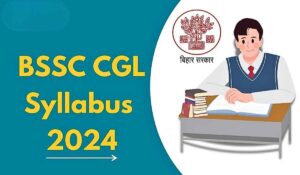
UPSC Syllabus 2024: IAS Prelims & Mains | Exam Pattern, Subjects, Marking Scheme: Union Public Service Commission (UPSC) conducts the Civil Services Examination to recruit for several positions like Indian Administrative Service (IAS), Indian Police Service (IPS), Indian Foreign Service (IFS), and other central services. The UPSC exam is conducted in three stages-
- Preliminary Examination (Prelims)
- Main Examination (Mains)
- Personality Test (Interview)
If you are an aspiring UPSC candidate and looking for the UPSC Syllabus for Prelims and Mains, then you are at the right place.
Suggested Read:-
SSC CGL Salary Structure Explained for All Posts: Grade Pay, Perks, Allowances
UPSC Syllabus Prelims 2024
The UPSC Preliminary Examination consists of two papers: General Studies Paper-I (GS Paper-I) and General Studies Paper-II (GS Paper-II), also known as the Civil Services Aptitude Test (CSAT). It is a screening test. One who clears the Prelims will be eligible to sit in the Mian Examination-
- No. of Papers: 2 compulsory papers
- Type of Questions: Objective (MCQ) type
- Total Maximum Marks: 400 (200 each paper)
- Duration of Exam: 2 hrs. each
- Negative Marking: Yes, 1/3rd of the marks
- Medium of Exam: Both Hindi & English
UPSC syllabus for General Studies Paper-I:
This paper contains 100 questions, which candidates have to cover in 2 hours. It covers-
- History of India and Indian National Movement: Encompasses Ancient, Medieval, and Modern Indian history, including the freedom struggle.
- Indian and World Geography: Covers physical, social, and economic aspects of geography at national and global levels.
- Indian Polity and Governance: Focuses on the Indian Constitution, political system, Panchayati Raj, public policy, and rights issues.
- Current Events of National and International Importance: Includes significant national and international news related to various domains.
- Economic and Social Development: Covers topics such as sustainable development, poverty, inclusion, demographics, and social sector initiatives.
- General issues on Environmental Ecology, Biodiversity, and Climate Change: Addresses environmental and ecological aspects with a focus on general awareness.
- General Science: Encompasses topics in biology, physics, and chemistry, focusing on fundamental concepts.
General Studies Paper-II Syllabus for UPSC:
This paper contains 80 questions, which candidates have to cover in 2 hours. It covers-
- Comprehension: Requires candidates to comprehend and analyze passages.
- Interpersonal skills including communication skills: Focuses on verbal interpretations, analogies, and critical reasoning.
- Logical reasoning and analytical ability: Covers topics such as sequence & series, coding & decoding, and blood relations.
- Decision-making and problem-solving: Involves ethical dilemmas and hypothetical scenarios.
- General mental ability: Includes topics like profit & loss, time & work, and geometry.
- Basic numeracy and Data interpretation: Encompasses topics related to numerical reasoning and data interpretation.
Suggested read: UPSC ESE Notification 2025 Last Date, Check Application Process
UPSC Syllabus Mains 2024
The UPSC Mains examination consists of nine conventional/theoretical papers. Among nine, 2 are qualifying papers for the main exam and the rest 7 are used for the final merit list. This is a description type of paper, which is conducted within five days.
- No. of Papers: 2 qualifying papers & 7 merit papers
- Type of Questions: Description type
- Total Maximum Marks: 2025 (300 or 250 for each paper)
- Duration of Exam: 3 to 3.5 hrs. each
- Negative Marking: Yes
- Medium of Exam: Both Local & English
- Qualifying Papers: Paper A, Paper B
- Paper counted for Merit: Paper-I, Paper-II, Paper-III, Paper-IV, Paper-V, Paper-VI, Paper-VII
Paper-I: Essay
In this paper, candidates need to write essays on multiple topics. It is a test to check the candidate’s ability to express ideas in an organized and concise manner.
Paper-II: General Studies – I (Indian Heritage & Culture, History & Geography of the World & Society)
This is a paper for 250 marks and covers a broad range of topics including-
- Indian culture, encompassing salient aspects of art forms, literature, and architecture from ancient to modern times
- Modern Indian history from the middle of the eighteenth century until the present, focusing on significant events, personalities, and issues
- The Freedom Struggle, its various stages, and important contributors from different parts of the country
- Post-independence consolidation and reorganization within the country
- World history, including events from the 18th century such as the Industrial Revolution, world wars, national boundaries, colonization, decolonization, and political philosophies’ effects on society.
- Indian Society and Diversity of India
- Role of women and women organistaion
- Effect of Globalization on Indian society
- Social empowerment, communalism, regionalism & secularism.
- world’s physical geography
- Important Geophysical phenomena such as earthquakes, tsunamis, Volcanic activity, cyclones etc with flora and fauna.
Paper-III: General Studies – II (Governance, Constitution, Polity, Social Justice & International Relations)
This paper is 250 words and focuses on various aspects including:
- Indian Constitution’s historical underpinnings, evolution, features, amendments, and significant provisions
- Functions and responsibilities of the Union and States, federal structure, devolution of powers and finances, and challenges therein
- Separation of powers between various organs, dispute redressal mechanisms, and institutions
- Comparison of the Indian constitutional scheme with that of other countries
- Structure, organization, and functioning of the Executive, Judiciary, Ministries, Departments, and Constitutional Bodies
- Parliament and State legislatures
- Features of the Representation, Hion of People’s Act.
- Issues relating to the development and management of the Social Sector, human resources, etc
- Issues related to poverty and hunger
- Government policies, interventions for development in various sectors, and issues arising out of their design and implementation
- Role of civil services in a democracy.
- India and its neighbourhood- relations.
- Bilateral, regional and global groupings
- Important International institutions, agencies and fora – their structure, mandate.
Paper-IV: General Studies – III (Technology, Economic Development, Biodiversity, Security & Disaster Management)
This paper is for 250 words and covers topics including:
- Indian Economy and issues relating to planning, mobilization of resources, growth, development, and employment
- Inclusive growth and issues arising from it
- Major crop cropping patterns in various parts of the country, different types of irrigation and irrigation systems storage, transport, and marketing of agricultural produce and issues and related constraints
- Food processing and related industries in India- scope and significance, location, upstream and downstream requirements, supply chain management and many more.
Paper-V: General Studies – IV (Ethics, Integrity & Aptitude):
This paper is for 250 marks and covers various ethical and integrity-related topics including:
- Ethics and Human Interface: Essence, determinants, and consequences of Ethics in human actions
- Attitude: Content, structure, function, its influence and relation with thought and behaviour
- Aptitude and foundational values for Civil Service, integrity, impartiality, non-partisanship, objectivity, dedication to public service, empathy, tolerance and compassion towards the weaker sections and many more.
Paper-VI: Optional Subject – Paper I
Candidates need to opt for any one Optional Subject from a list of options such as Agriculture, Animal Husbandry and Veterinary Science, Anthropology, Botany, Chemistry, Civil Engineering, Commerce and Accountancy, Economics, Electrical Engineering, Law, Management, History, Geology, Mechanical Engineering, Medical Science, Physics, Statistics, Zoology and more. YOu can also select literature from a list of languages.
Paper-VII: Optional Subject – Paper II
Similar to Paper VI, candidates need to choose one optional subject, and this paper also lists of of subjects. The subject will be the same as Paper-VI.
FAQs:-
1. What is the UPSC exam and why is it important?
The UPSC exam is the Union Public Service Commission examination conducted to recruit candidates for various administrative positions in the Indian government. It is crucial as it selects candidates for prestigious roles like the Indian Administrative Service (IAS), Indian Police Service (IPS), and others.
2. What qualifications are required to apply for the UPSC exam?
Candidates applying for the UPSC exam need to have a graduation degree or an equivalent qualification.
3. How many stages are there in the UPSC exam?
The UPSC exam comprises three stages: Preliminary Examination (Prelims), Main Examination (Mains), and Personality Test (Interview).
4. What does the Preliminary Examination consist of?
The Preliminary Examination includes two papers: General Studies Paper-I (GS Paper-I) and General Studies Paper-II (GS Paper-II), also known as the Civil Services Aptitude Test (CSAT).
5. What subjects are covered in the Main Examination?
The Main Examination includes nine papers, including two qualifying papers and seven merit-based papers covering a wide range of subjects.
6. Is there negative marking in the UPSC exam?
Yes, there is negative marking in the UPSC exam. One-third of the marks are deducted for each incorrect answer.
7. What is the best way to prepare for the UPSC exam?
Optimal preparation for the UPSC exam involves studying previous year’s question papers, mock tests, and various study materials available.
8. What is the last date to apply for the UPSC exam?
The last date to apply for the UPSC exam is mentioned in the official notification released by the commission.
9. When are the interviews conducted for the UPSC exam?
The interviews for the UPSC exam are conducted after the Main Examination, as part of the Personality Test stage.
10. How are the candidates selected for various services through the UPSC exam?
Candidates are selected based on their performance in the Main Examination and the Personality Test, along with their eligibility criteria and reservation guidelines.





